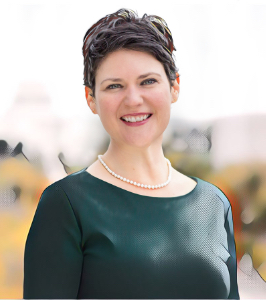The ‘we’ concept of freedom
This idea — that we preserve freedom by protecting it for all and not just the privileged few — is at the heart of BJC’s calling to advocate for everyone’s faith freedom.

In the introduction to her new book of cultural criticism titled On Freedom, author Maggie Nelson writes that she “takes it as a given that our entire existence, including our freedoms and unfreedoms, is built upon a ‘we’ instead of an ‘I.’” She draws her inspiration from a 2018 essay for The Atlantic by Ta-Nehisi Coates, in which he describes “a kind of freedom — a white freedom, freedom without consequence, freedom without criticism, … a Stand Your Ground freedom, freedom without responsibility, without hard memory; … not the freedom of Harriet Tubman, which calls you to risk your own; not the freedom of Nat Turner, which calls you to give even more.”
Before Nelson and before Coates, Paul the Apostle makes a similar argument in his ode to freedom — his letter to the Galatians: “It is absolutely clear that God has called you to a free life. Just make sure that you don’t use this freedom as an excuse to do whatever you want to do and destroy your freedom. Rather, use your freedom to serve one another in love; that’s how freedom grows. For everything we know about God’s Word is summed up in a single sentence: Love others as you love yourself. That’s an act of true freedom.” (Galatians 5:13-14, The Message)
This idea — that we preserve freedom by protecting it for all and not just the privileged few — is at the heart of BJC’s calling to advocate for everyone’s faith freedom. We advocate for freedom built on “we” and not just “I.” Our calling remains urgently needed as freedom is threatened, sometimes by those who would claim to act in the name of “religious freedom” but from a wholly self-involved perspective that does not take into account the harm that may be caused to others if that freedom is indulged without limitation.
As we close 2021 and look forward to a new year, in no sense of the word are we free of COVID-19 and its variants. While we have seen signs of hope as the virus has waned for periods this year and millions have been vaccinated, we still have stubbornly high daily case rates. Throughout this fall, an average of more than 1,000 Americans have died every day from COVID-19.
And yet efforts to control the spread of the virus and disease and to liberate ourselves and our way of life have been stymied in the name of freedom — freedom to move about society without masks and without vaccinations, even though both tools have proven to be effective in protecting ourselves and our neighbors. Efforts by elected officials and public health officers to impose mask and vaccine mandates have been labeled by some as tyrannical.
Even in our constitutional system that places very high value on individual liberties, those rights are not unlimited. Instead, we do everything we can to accommodate individual rights, including religious freedom rights, while taking into account the impact on other people’s rights and liberties as well.
Holly Hollman and I discussed the concept of balancing society’s interest in public health and an individual’s claim to a religious exemption to a vaccine mandate on Respecting Religion this fall. Novel and complicated issues of law and policy like these deserve our respectful conversation — conversations that Holly and I are fortunate to have and share with the public through the podcast. I hope you will subscribe to Respecting Religion on your favorite podcasting provider and share it with others in your networks and communities.
Generous donations from individuals like you who want to stand up for this freedom grounded in love and care of neighbor make the podcast, this quarterly magazine, 2021’s outstanding in-person and virtual programming, the Christians Against Christian Nationalism initiative and all of BJC’s work free and available for everyone as a public resource for education and advocacy.
As we end this year, I invite you to join BJC’s movement for faith freedom for all. Please consider making a year-end donation, either online at BJConline.org/give. Your gift sends a powerful message that you want to invest in the “we” concept of freedom — that you believe as we do that we protect our communal freedom by using our individual freedom to serve one another.
This column first appeared in the winter 2021 edition of Report from the Capital. You can download it as a PDF or read a digital flip-through edition.




